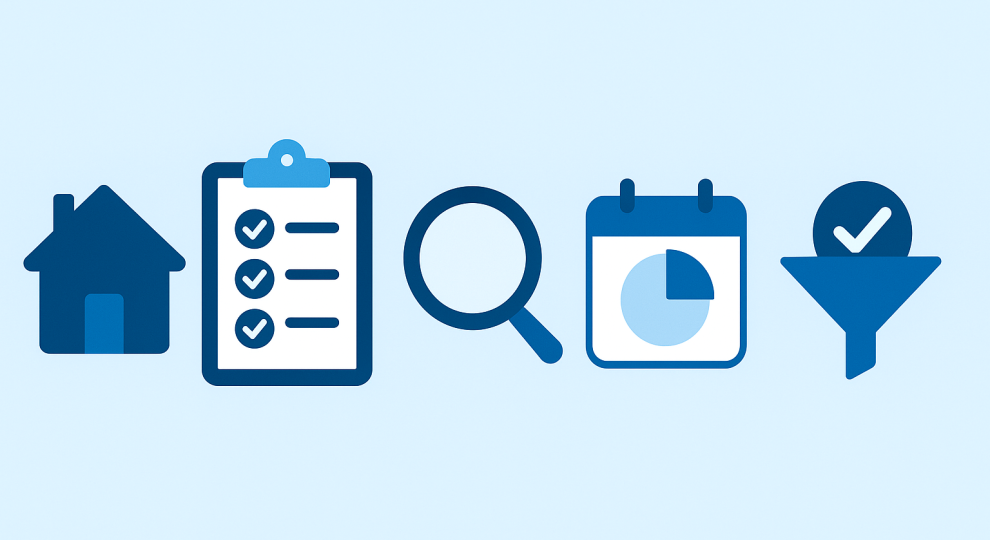
How to choose good tenants in 10 easy steps
If you’ve wondered how to choose good tenants, you’re not alone. The good news is there’s a simple, repeatable process that removes guesswork. Below, you’ll see how to choose good tenants with clear steps you can apply to every application.
What makes a good tenant
A good tenant is able to verify their identity and income, provides a clean rental ledger, passes database checks, offers solid references, and can comfortably afford the rent. Keep it practical, consistent, and written down.
Step 1: Verify identity of rental applicants
Collect government photo ID (licence or passport). Make sure the name, date of birth and current address match the application and the person who inspected. Store ID securely and remove it when no longer required.
Step 2: Confirm income
Part of how to choose good tenants is confirming ability to pay.
- Employees: Last two payslips (or contract + one payslip if they’ve just started).
- Self-employed/business owners: Most recent tax return or an accountant letter; BAS or a recent P&L if income fluctuates.
Sense-check: if you’ve received a bank statement from the tenant with their application, do bank deposits line up with the payslips? Are dates and totals consistent?
Step 3: Check rental history
Ask for the rental ledger from the current or most recent tenancy and, if available, a copy of the lease or prior manager’s details. Look for on-time payments, bond details, inspection notes and end-of-tenancy condition.
Step 4: Run tenancy database checks (with consent)
Another pillar of how to choose good tenants is running checks with National Tenancy Database (NTD) and TICA. These can flag arrears, tribunal orders and identity issues so you can decide with confidence.
A Rental History Check is Vital for Landlords
A Rental History Check is Vital for Landlords | PropertyNow
Step 5: Call references and cross-check
References complete the picture in how to choose good tenants.
Landlord/agent: Was rent paid on time? Was the property well maintained? Any disputes? Why did they move?
Employer/accountant: Job title and employment type, annual salary (or rate × typical hours), and time in role (plus probation if relevant). Ask for specifics, not vague praise.
If you’ve advertised your property through an online agent like PropertyNow, you will be able to arrange for this to be done for you. In some cases, if tenants have been proactive, some third party references may already be on their application.
Step 6: Consider Affordability: the 30% guide
A practical rule in how to choose good tenants is rent ≤ 30% of gross household income.
Example: Household income $2,000/week → 30% = $600. A $550/week property is likely manageable; $700/week may be a stretch unless there are strong compensating factors (savings, stable dual incomes). Treat this as a guide, not a brick wall—look at the whole application.
Step 7: Tie-breakers: timing and lease term
For how to choose good tenants, it’s reasonable to note behaviours that relate to tenancy success—punctuality, courtesy during the viewing, practical questions, providing documents promptly, and clear, timely communication. These are objective signals of reliability and how easy the tenancy may be to manage. Use them as tie-breakers only when two applicants are otherwise equal on the core checks (ID, income, rental history, NTD/TICA, references, affordability). Avoid subjective judgements (appearance, family situation, personal beliefs) and record specific examples in your comparison notes so your decision stays consistent and defensible.
Other tie breakers if you’re comparing two strong applications could include:
- Move-in date (ready now vs in three weeks)
- Lease term (six months vs twelve months)
Step 8: Be wary of possible red flags
Finally, how to choose good tenants means investigating—not assuming:
- Inconsistent ID details or altered documents
- Gaps in employment without explanation
- Repeated late payments on the ledger
- References that can’t be reached or sound coached
- Refusal to consent to tenancy database checks
If something doesn’t add up, request clarifying documents—politely and consistently with every applicant.
Step 9: Remember the two “C”s
When weighing applications, it’s important to be consistent and compliant. Apply the same criteria to every applicant and keep brief notes on what you checked and why you decided. Do not discriminate based on race, sex, pregnancy, age, disability (including illnesses), marital/domestic partner status, sexual orientation or gender identity.
Guarantors: don’t ask for or require one—only consider a guarantor if the applicant offers it voluntarily, and check local rules before accepting.
Should you Google applicants or check social media?
It’s tempting, but it’s rarely helpful and can create privacy and discrimination risks. You also risk mistaken identity. In Australia, you should collect only what’s reasonably necessary to assess an application (ID, income, rental history, references, tenancy database checks). If you still choose to look online, use it only to confirm facts the applicant has already provided (e.g., business name for a self-employed applicant), never to judge lifestyle or any protected attribute. Don’t send friend requests, don’t screenshot or store irrelevant personal content, and apply the same process to everyone. If you stumble on information you don’t need for tenancy decisions, disregard it and don’t retain it. Keep a brief note of what you checked and why, so your file stays factual and fair.
Step 10: Declining applications
Once you know the application you’d like to proceed with, close the loop for other applicants with clear, factual communication tied to your criteria. For example: “We selected an applicant with stronger rental history and an earlier move-in date.” Avoid subjective feedback or personal opinions.
Ready to make choosing good tenants easier?
Our applications are compliant with rules in every state, include a built-in checklist of tasks to review applicants, and surface an affordability ratio with a simple summary of potential risks—so how to choose good tenants becomes faster, fairer, and far less stressful.
